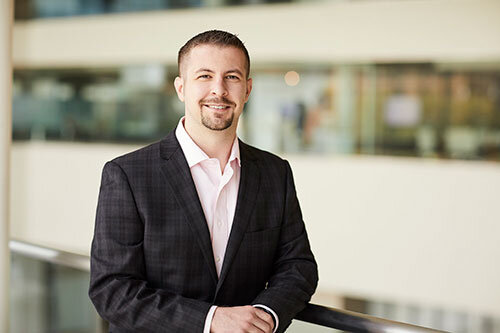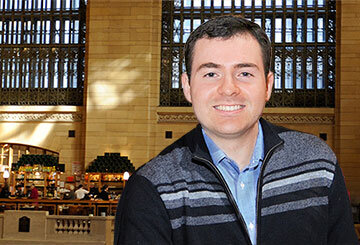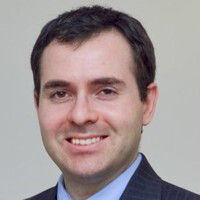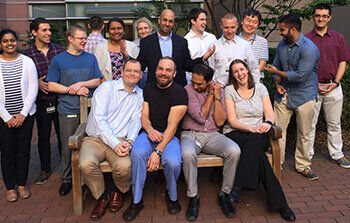
After graduating from the NIH OxCam program in 2007, with a landmark paper in Nature describing the discovery of a new type of stem cell called the epiblast stem cell, Dr. Paul Tesar continued his training as a postdoctoral fellow at the National Institute of Neurological Disorders and Stroke at the National Institutes of Health. Dr. Tesar then went on to join Case Western Reserve University (his alma mater) School of Medicine faculty in 2010. As an associate professor, his laboratory has “pioneered new regenerative approaches to treat nervous system disorders including multiple sclerosis, pediatric leukodystrophies, cerebral palsy, and brain cancer.
In addition to mentoring students and postdocs, Dr. Tesar’s team has gone on to become leaders in their field. Dr. Tesar has received numerous awards including the International Society for Stem Cell Research Outstanding Young Investigator Award in 2015, the New York Stem Foundation – Robertson Stem Cell Prize in 2017, and the Diekhoff Award for Graduate Student Mentoring in 2018.
Dr. Tesar’s lab continues to strive for success and their most recent collaboration with Dr. Drew Adams’ lab resulted in an exciting publication in the journal Nature: https://go.nature.com/2LFAbFe. This publication defined a unifying mechanism by which small molecules stimulate the generation of new oligodendrocytes and enhance remyelination. Because of these findings, efforts to develop safe and effective medicines for patients with Multiple Sclerosis and other myelin disorders are on the horizon. These discoveries led Dr. Tesar and Dr. Adams to form a startup company called Convelo Theraputics, which will develop new regenerative medicines for myelin disorders. To learn more about this incredible company check out this link: https://bit.ly/2uPwYcR.

 Dr. Eugene Shenderov completed his PhD as a Rhodes Scholar from the NIH OxCam Program in 2009. In 2009, he co-founded the Charm City Clinic, Inc. which is a non-profit organization that helps East Baltimore residents access health care, social services, and develop health literacy. Dr. Shenderov then went on to become President and CEO of LifeImmune, Inc., in 2015 and is developing a novel diagnostic test to detect drug, food, and environmental allergies.
Dr. Eugene Shenderov completed his PhD as a Rhodes Scholar from the NIH OxCam Program in 2009. In 2009, he co-founded the Charm City Clinic, Inc. which is a non-profit organization that helps East Baltimore residents access health care, social services, and develop health literacy. Dr. Shenderov then went on to become President and CEO of LifeImmune, Inc., in 2015 and is developing a novel diagnostic test to detect drug, food, and environmental allergies.
Today, Dr. Eugene Shenderov is an oncology Fellow at Johns Hopkins Medical Center, Co-Founder and Executive Board Member of the Charm City Clinic, and President and CEO of LifeImmune, Inc. In 2017, Dr. Shenderov was selected as 1 of 100 “Leaders of Tomorrow” by the Global Biotech Revolution and selected to the Johns Hopkins Physician Scientist Training Program (PSTP) 2017 Scholars Class for Residents and Fellows. Since the beginning of 2018, Dr. Shenderov has been named one of 50 Oncology Fellows nationally selected for the 2018 National Comprehensive Cancer Network (NCCN) Oncology Fellows Program at the NCCN 23rd Annual Conference. Not to mention he was also awarded the distinguished Conquer Cancer Foundation of ASCO/Ruth Rales Young Investigator Award!

Guess who was just named as one the University of Georgia Alumni Association’s “40 under 40”? Our 2015 graduate Dr. Muktha S. Natrajan was a Gates Cambridge Scholar and studied under Professor Robin Franklin, PhD at Cambridge University and Dr. Bibiana Bielekova, MD at the Neuroimmunology Branch at the NIH. Her research focused on potential treatments for Multiple Sclerosis (MS), trying to understand the link between why neural stem cells fail to regenerate in MS and how to harness the beneficial aspects of the immune system to promote failed regeneration in aging patients.
Dr. Muktha S. Natrajan is currently a postdoctoral fellow at Emory University and was just named “40 Under 40” at the University of Georgia. This incredible achievement celebrates young alumni leading the pack in their industries and communities. In her current position, under the mentorship of Dr. Mulligan, Dr. Natrajan develops diagnostics to better predict disease course and focuses on the antibody responses to Zika Virus and innate immunity. She is also the coordinator for the Systems Biology Core Facility at Emory University.

Dr. Justin Lathia has just been awarded the Cleveland Clinic Lerner Research Institute’s Inaugural Rising Star Award. This new, prestigious award honors scientists who are in their first 10 years of independent research with a rising trajectory in publications and funding, and who are strongly committed to making Lerner a better place. The Lerner Institute is home to basic, translational, and clinical research at the world-renowned Cleveland Clinic (the number 2 hospital in the nation according to US News and World Report 2017 rankings).
After graduating from the NIH OxCam program in 2008, Dr. Justin Lathia became a post-doctoral fellow at Duke University and also at the Cleveland Clinic. He was hired as a faculty member in 2012. Dr. Lathia is an Associate Professor in the Department of Cellular and Molecular Medicine at the Lerner Research Institute at the Cleveland Clinic and mentor’s a lab of over 10 people, ranging from graduate students to postdocs to fellows. His work focuses mainly on malignant brain tumors, but his technology and interests are applicable to many other tumor types.

An incredible woman in science and inspiration to many, Dr. Dani Bassett is someone everyone should be watching! Dr. Dani Bassett, NIH OxCam Class of 2009, received her PhD in Physics under the mentorship of Dr. Thomas Duke, Dr. Ed Bullmore, and Dr. Andreas Meyer-Lindenberg. Then, she went on to become a Postdoctoral Research Associate at The University of California Santa Barbara and also, a Sage Junior Research Fellow, before become a faculty member at The University of Pennsylvania.
The Bassett Lab focuses on isolating problems at the intersection of basic science, engineering, and clinical medicine that can be tackled using systems-level approaches. They seek to develop new mathematical methods with the goal of predicting system behavior and designing perturbations to affect a specific outcome. The Bassett lab also develops analytic tools to probe the “hard-wired pathways and transient communication patterns inside of the brain in an effort to identify organizational principles, to develop novel diagnostics of disease, and to design personalized therapeutics for rehabilitation and treatment of brain injury, neurological disease, and psychiatric disorders.”
In 2014, she was the youngest individual to be awarded a MacArthur fellowship. Not to mention, in 2016, she was named one of the ten most brilliant scientists of the year by Popular Science magazine. Dr. Bassett is an Eduardo D. Glandt Faculty Fellow and Associate Professor at the University of Pennsylvania mentoring more than 20 members and has seen even more go on to become students and professors at prestigious institutions. She was recently named the 2018 recipient of the Erdős-Rényi Prize in Network Science by the Network Science Society (NetSci) for her “fundamental contributions to our understanding of the network architecture of the human brain, its evolution over learning and development, and its alteration in neurological disease.”



 Dr. Eugene Shenderov completed his PhD as a Rhodes Scholar from the NIH OxCam Program in 2009. In 2009, he co-founded the Charm City Clinic, Inc. which is a non-profit organization that helps East Baltimore residents access health care, social services, and develop health literacy. Dr. Shenderov then went on to become President and CEO of LifeImmune, Inc., in 2015 and is developing a novel diagnostic test to detect drug, food, and environmental allergies.
Dr. Eugene Shenderov completed his PhD as a Rhodes Scholar from the NIH OxCam Program in 2009. In 2009, he co-founded the Charm City Clinic, Inc. which is a non-profit organization that helps East Baltimore residents access health care, social services, and develop health literacy. Dr. Shenderov then went on to become President and CEO of LifeImmune, Inc., in 2015 and is developing a novel diagnostic test to detect drug, food, and environmental allergies.

